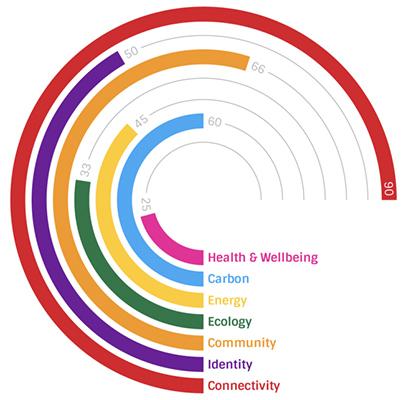Project Process
When applied to a property project (for example a new-build development, a refurbishment of an existing building, or our ongoing management of our historic estate) our seven ROPP Principles are embedded in the project through a process of ‘assess and review’ at five key project stages, as follows:
- Stage 1 – Options Assessment / Screening
At the very outset, before any key decisions are made, we establish that a project can successfully achieve our ROPP goals. If so, we then set a strategic direction of travel for our approach to it – whether it is something we should (or must) invest in (and therefore to do so in accordance with ROPP Principles), whether we should seek to divest of it to a third party, or whether we should partner with others to take it forward (again, in accordance with ROPP Principles).
- Stage 2 – Visioning & ROPP Action Plan
If, at Stage 1 we have concluded that this is a project we should take forward and invest in, either alone or in partnership, Stage 2 commences with a project inception Co-Creation Workshop. This is a collaborative kick-off workshop attended by our ChCh in-house professional team, any appointed third-party professionals, partners, and key stakeholders and community representatives. The outputs of the Co-Creation Workshop are a high-level vision for the project and an initial ROPP Action Plan (including a decision on the use of any relevant external industry benchmarks / best-practice processes to be applied).
- Stage 3 – Pre-Planning Review
Prior to the submission of any Planning application, the ROPP Action Plan is updated and re-scored to reflect any changes to the initial Stage 2 plan flowing from detailed design work that has taken place thereafter. This is submitted to the Challenge Group for transparency and comment / approval.
- Stage 4 – Pre-delivery review
Prior to the commencement of any construction works, the ROPP action plan is updated and re-scored to reflect any changes to the approved Stage 3 plan flowing from detailed design work that has taken place thereafter. This is submitted to the Challenge Group for transparency and comment / approval.
- Stage 5 – Post Completion Evaluation
At completion of works stage a post-completion / occupancy evaluation is carried out – the ROPP is updated and re-scored as evidence that the project has delivered ROPP benefits in action. This could be two and/or five years after completion depending on the type of project, phases etc.
This ROPP process covers the sale / development of the House’s property assets. It is also applied to the management of our operational property portfolio, although this can be more challenging than with new-build development, given the historic, Listed nature of the estate, and may therefore require some minor adaptation.
Governance

Governance of the ROPP process lies with the ROPP Challenge Group. This group brings external perspective, expertise, and challenge to the House’s real estate activity.
The Group’s responsibility is to provide horizon scanning and to scrutinise the effectiveness of the House’s ROPP policy implementation on a regular basis.
In addition, the Group is required to review post occupancy evaluations as required and advise on the appropriateness of market benchmarks against which projects are assessed. From time-to-time the Group may be focused on particular areas of policy implementation, for example decarbonisation of the real estate portfolio.
The ROPP Challenge Group comprises (up to) seven Members nominated from our Governing Body. To avoid conflicts, Members will not engage directly on the House’s real estate project activity in any other capacity unless approved by the Challenge Group Chair and fully disclosed at a Group meeting.
In accordance with good governance and to protect the independence of the audit function, Members will serve three yearly terms with a maximum term of nine years and a staggered retirement (seeking to avoid more than one retirement in a year). New Members have an induction to explain the scope of real estate activity and ROPP process.
The Challenge Group meets three times a year. Each meeting will have at least one project review – undertaking a ‘deep dive’ to be presented by the project lead – and a review of one or more relevant Principle(s) led by the Member responsible.

